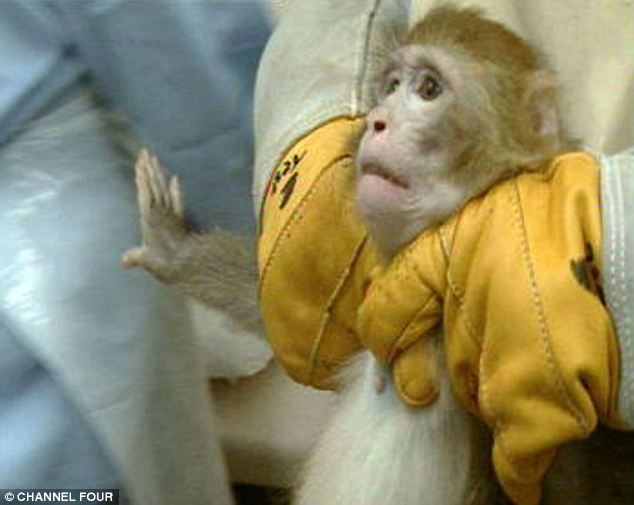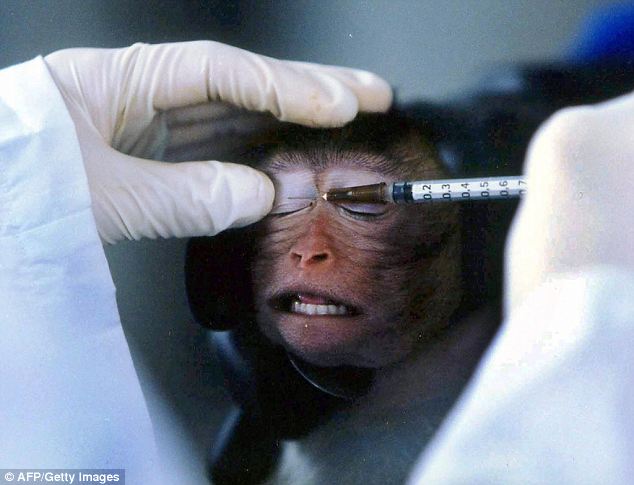- Animal rights groups describe the figure, highest since 1982, as ‘shocking’
By Fiona Macrae
The number of animal experiments carried out in the UK topped four million last year with a sharp increase in the number of monkeys used in laboratories.
Home Office statistics show that 4.11million experiments were carried out in university, charity and commercial labs in 2012 – an 8 per cent jump on the previous year.
The total, the highest since 1982, has emerged three years after the Coalition pledged in its programme for government to ‘work to reduce the use of animals in scientific research’.

Good science? A monkey is restrained by researchers conducting animal testing in a still from Channel 4’s controversial ANIMALS documentary. Last year 2,186 monkeys were used in animal experiments
Scientists and medical research charities stress that animals are only used when no other alternatives are available and say that many significant advances in modern medicine have their roots in animal work.
But animal rights groups described the figures as ‘shocking’ and said that failure to cut numbers was completely unacceptable.
The figures include experiments aimed at improving animal and human health but they also take in the breeding of GM creatures.
The bulk of the rise can be explained by an ‘explosion’ of interest in mutant mice that have been bred to carry certain genes or to develop symptoms of human disease.
Mice are particularly favoured because they are small, cheap and easy to work with. But, crucially, 99 per cent of mouse genes exist in the human body in some shape or form.
Professor Dominic Wells, of Royal Veterinary College in London, said that GM mice could help in the search for treatments for hundreds of thousands of rare diseases.
He said that, legally, new drugs must be tested on people and that if he was ill, he would ‘certainly not queue up’ to take a drug that had only been tried out on cells in a dish.
Research on great apes, such as chimps and gorillas, is banned in the UK.
But there was a 50 per cent increase on the number of marmosets, macaques and other monkeys used in experiments, taking the total to 2,186.
Monkeys’ intelligence and close biological links to people make them popular for studying brain, fertility and immune diseases.
They are also of value in gauging how new, highly complex drugs will fare inside the human body.
However, experts cautioned that the rise may have been a statistical blip, caused by data being carried over from 2011, when the figure for monkeys was unusually low.
Overall, the bulk of the work – 74 per cent – was carried out on mice. Fish accounted for 12 per cent of the total, rats made up 7 per cent and birds, 4 per cent.
Dogs were used almost 5,000 times and cats on 247 occasions. Work on sheep, goats and guinea pigs rose, while experiments on fish, rabbits and pigs fell.

Injection: Research on great apes, such as chimps and gorillas, is banned in the UK, but there was a 50 per cent increase on the number of marmosets, macaques and other monkeys used in experiments
The British Union for Abolition of Vivisection, described the rise in animal experiments as ‘shocking’, while People for the Ethical Treatment of Animals urged the Government to keep its promise to cut the number of animals used.
Wendy Jarrett, of the charity Understanding Animal Research said work on GM mice was helping scientists realise the ‘impossible dream’ of finding new treatments for illnesses such as motor neurone disease.
She added: ‘A huge amount of scientific, medical and veterinary research is done without the use of animals but in some cases we still need to use animals if we want to find the medical and veterinary treatments of tomorrow.’

